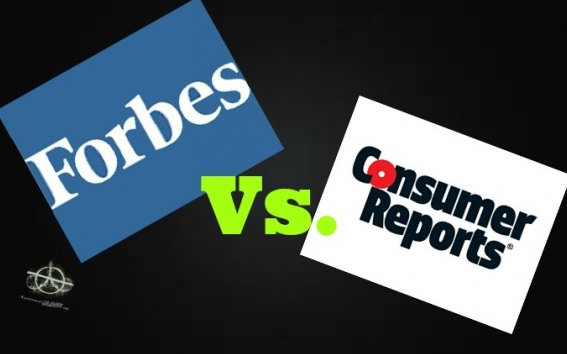| Online: | |
| Visits: | |
| Stories: |

| Story Views | |
| Now: | |
| Last Hour: | |
| Last 24 Hours: | |
| Total: | |
Forbes Calls Consumer Reports Anti-Science in a Pro-GMO Rant That…Lacks Science
 Daisy Luther
Daisy Luther
Activist Post
Forbes Magazine is known for its lists of the wealthiest people and companies. Frequently they use their influence to slyly support their big dollar buddies in the biotech industry.
Forbes successfully plumbed a new depth with an attack on Consumer Reports magazine last week.
Consumer Reports did an article ranking different milk substitutes for its readers. In that report, they (gasp) referred to the inclusion of GMOs as a “con” in their review on soy milk.

The hound in this case was Jon Entine. Entine, a pro-GMO activist, was very distressed by this report. I know this because he said so, repeatedly, ranting his way through an entire article about how CR has let him down with their complete ignorance about science.
Which makes it all the more distressing that this once venerable institution-in-a-magazine has driven off the science cliff in obeisance to the current hysteria—yes, we are listening Neil deGrasse Tyson—over genetically modified foods…
But the most egregious CR development is its unexplained dissing of GMO soy milk. Upwards of 94% of the US soy crop is GMO so it’s no surprise that your favorite edamame or your morning glass of soy milk is made from soy beans designed to be grown with fewer insecticides (Bt soy) or less toxic herbicides (herbicide resistant soy). In its “Cons” section, CR encourages consumers to “Look for brands with the USDA organic seal or the non-GMO verified label.”
But why? It never explains, and based on CR’s stated intention to rely on evidence to form its judgments, it’s violating its own guidance. After all, there is not one published study that suggests that GM soy products are any less nutritious than alternatives; nor are they, or any approved GMO food, harmful in any way. In fact, it’s well established that organic products, including soy milk, are more likely to have a higher risk of pathogen contamination.
 Just to recap here: Entine is upset that CR is letting consumers know that the ingredients in soy milk are most likely GMO. He seems to disregard the fact that if consumers are concerned about GMOs in their diets, this is legitimately, a “con” and is important information for those of us who wish to identify and avoid GMO. If the consumer doesn’t care about GMOs, he or she is unlikely to take this warning to heart and will blithely guzzle down the negatively-reviewed product.
Just to recap here: Entine is upset that CR is letting consumers know that the ingredients in soy milk are most likely GMO. He seems to disregard the fact that if consumers are concerned about GMOs in their diets, this is legitimately, a “con” and is important information for those of us who wish to identify and avoid GMO. If the consumer doesn’t care about GMOs, he or she is unlikely to take this warning to heart and will blithely guzzle down the negatively-reviewed product.
Entine wants you to know that GMO soy is actually better for you, also – you know, because they use less insecticide and herbicide when growing it. (I must have missed the “science” that says that these plants are sprayed less – and also that if they are, that less chemicals are better than no chemicals – I hope someone can send me a link to those reports. Please and thank you.) As well, Entine takes a moment to point out the organic products are worse for you than GMOs (he must have forgotten to put in the evidence of this “well-established fact” because that link goes no where.) It’s important to note that all of Entine’s “science” links back to his own site, pompously called the Genetic Literacy Project. Because the rest of us are…you know…illiterate. His theories are remarkably similar to the propaganda and the lies that the biotech industry espouses.
But Entine doesn’t stop with praising the health benefits of GMOs and the likelihood of a horrid death-by-pathogens from that nasty organic food.
Oh no.
His ire takes on a target completely unrelated to Consumer Reports, the Organic Consumers Association. The “radical Organic Consumers Association.” (Because we all know those organic food hippies are just crazy.) While he’s on the topic of how awesome GMO soymilk is, he took this opportunity to criticize both the OCA and a company that responded to activists by removing GMOs from their soy milk, all in one condescending fell swoop.
This is not the first time that activists have brandished their anti-science club to quash empirical based thinking on the issue of soy milk. In 2009, Dean FoodsDF +0.88%, owner of the Silk Soymilk brand, faced a barrage of criticism from food activists when it switched from organic to conventional soybeans, calling it their “natural” line—which was correct. The move was actually done for the best of reasons. Most certified organic soybeans are sourced from countries with low or non-existent labor standards; the switch to conventional soy means that workers would not being exploited to satisfy Silk Soymilk customers.
The radical Organic Consumers Association went on a rampage, calling for a boycott—and it was effective. Rather than stand by its ideals and its fair labor commitment, Dean caved, throwing its worker protection pledge under the bus to embrace the anti-GMO scare campaign. It now positions itself as a driver of the fear bus. “GMOs? No thanks,” Silk.com writes on its web page. “We think the less you mess with Mother Nature, the better.”
Kevin Folta, the head of the University of Florida plant technology program, who is clearly unbiased *snort* in his support of GMOs, pointed out unhappily that Consumer Reports, by criticizing GMOs, gave ”a backdoor endorsement of organic and non-GMO verified brands.” Isn’t it interesting how suggesting one thing is bad, Consumer Reports is accused of endorsing something else?
Entine summed up his disappointment with Consumer Reports’ anti-GMO stance with his own unsubstantiated pronouncement:
The only difference between soy milk made with GM soy and alternatives is that the substituttes (sic) would almost certainly cost a heckuva a lot more because of the price premium extracted by organic producers. In other words consumers would be paying more for no benefits.
Is that the kind of advice that you want from Consumer Reports? How to spend more for new (sic) real benefits?
 Forbes Magazine has a history of promoting the interests of Big Business. If you google “Forbes and GMOs” you’ll find a long list of pro-Biotech propaganda, including 2000+ Reasons GMOs Are Safe to Eat (also penned by Entine, who must get a heck of a Christmas present each year from the folks who sell GMO seeds.) Meanwhile, Forbes mocks organic consumers as “agricultural narcissists.”
Forbes Magazine has a history of promoting the interests of Big Business. If you google “Forbes and GMOs” you’ll find a long list of pro-Biotech propaganda, including 2000+ Reasons GMOs Are Safe to Eat (also penned by Entine, who must get a heck of a Christmas present each year from the folks who sell GMO seeds.) Meanwhile, Forbes mocks organic consumers as “agricultural narcissists.”
The creators of the famous Forbes 500 lists have a dubious interest in educating the public if it might lower the net worth of companies with questionable ethics like Monsanto and Dow. In fact, articles like these could potentially manipulate markets by using their influence to attempt to sway public opinion. By setting themselves up as well-educated experts and condescending to the rest of us ignorant fools with ad hominem cries of “anti-science”, they promote the money makers: low quality, dirt cheap ingredients that can be highly processed and marked up with an enormous profit margin.
But honestly. Forbes really just wants you to have the scoop about genetic modification. Forbes Magazine wants you to know that GMOs are good for you, and that organics contain deadly pathogens. Forbes cares about you.
Further reading
- Techniques of Propaganda and Persuasion
- GMO Free Diet: How to stay healthy by identifying and avoiding dangerous foods
- We’re Monsanto: Feeding the World, Lie After Lie
- Organic: A Journalist’s Quest to Discover the Truth behind Food Labeling
Source: http://www.activistpost.com/2014/08/forbes-calls-consumer-reports-anti.html






The GMO issue is incredibly simple:
1) do credible studies by credible researchers using real science protocols. The terms “credible” and “real science” locks out about 95% of all corporations.
2) label all products that contain even the smallest particle of GMO (in large type print).
As it stands, GMO has a unique fingerprint:
1)GMO was politically introduced into the food supply with no testing (thanks to Bush Sr and demrep buddies)
2) their fight against labeling
3) their behavior in the seed market
4) their bottomless pockets for funding lawsuits after GMO crops contaminate non-GMO crops
From my research, it appears that GMO is slow-motion poison and I no longer eat processed food. Further, I have to wonder — If not for paid political power and endless litigation, would these seriously evil companies even exist?